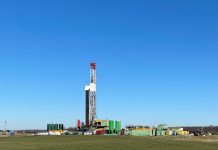WASHINGTON — Bipartisan legislation introduced Feb. 13 would exempt livestock farmers from reporting to the U.S. Coast Guard emissions from the natural breakdown of manure on their farms.
Sens. Deb Fischer, R-Nebraska, introduced the “Fair Agricultural Reporting Method (FARM) Act.” Cosponsors of the bipartisan legislation include Sens. John Barrasso, R-Wyo.; Pat Roberts, R-Kan.; Mike Rounds, R-S.D.; Joe Donnelly, D-Ind.; Heidi Heitkamp, D-N.D.; Chris Coons, D-Del.; and Tom Carper, D-Del. (Read the legislation.)
It would exempt farmers from reporting routine farm emissions under the Comprehensive Environmental Response, Compensation and Liability Act (CERCLA).
A U.S. Environmental Protection Agency rule, CERCLA is more commonly known as the “Superfund Law,” and is used to clean hazardous waste sites but also includes a mandatory federal reporting component.
Because of a recent appeals court decision, the CERCLA law could require farms to generate emissions reports unless Congress legislates a change to the underlying law.
The threshold translates to farms with roughly 200 head of cattle or a pig farm with two swine finishing barns could potentially be subject to the reporting requirement.
“Routine emissions from hog manure do not constitute a ‘hazardous’ emergency that requires the Coast Guard to activate a national cleanup response,” said National Pork Producers Council President Ken Maschhoff, a pork producer from Carlyle, Ill.,
“EPA exempted farms from CERCLA reporting because it knew responses would be unnecessary and impractical. Frankly, the court created a problem where none existed.”
Background
In 2008, the U.S. Environmental Protection Agency (EPA) exempted most farms from reporting the release of manure-related ammonia and hydrogen sulfide under both CERCLA and the Emergency Planning and Community Right to Know Act of 1986 (EPCRA), deeming such reports unnecessary.
However, in April 2017, the D.C. Court of Appeals directed the removal of this exemption for dairy and other livestock operations from the two federal laws.
Related story: Livestock farmers face emissions deadline
In October 2017, EPA filed a motion requesting that the court extend its stay on requiring livestock farm compliance with CERCLA and EPCRA until January 2018.
It also issued its interpretation that reporting under EPCRA was not necessary because the air emissions are associated with routine agricultural operations, which are exempt.
EPA plans to address the interpretation further via a rulemaking process.
The court was expected to issue its mandate after Jan. 22, but on Jan. 19, EPA filed a request to delay the compliance date for an additional 90 days. The court granted EPA’s request.
Filing woes
According to the National Pork Producers Council, some farmers tried filing reports Nov. 15, but the system was overwhelmed. In one case, an operator sent notices to more than 20 state and federal response authorities, including the Department of Homeland Security, the Centers for Disease Control and Prevention and a state police agency, after receiving a report.
The National Milk Producers Federation continues to recommend that producers do not file any emissions reports until the legal issue is resolved. In the meantime, it has been preparing preliminary materials to assist dairy farmers in calculating emissions and filing reports if it becomes necessary.
Related articles:
Will you have to report livestock emissions? It’s up to Congress March 19, 2018
Court extends livestock emissions reporting deadline Dec. 4, 2017
Livestock farmers face emissions deadline Nov. 14, 2017
Superfund not meant for farms March 15, 2007
Commentary: Is that a Superfund site or a farm? Nov. 23, 2005










